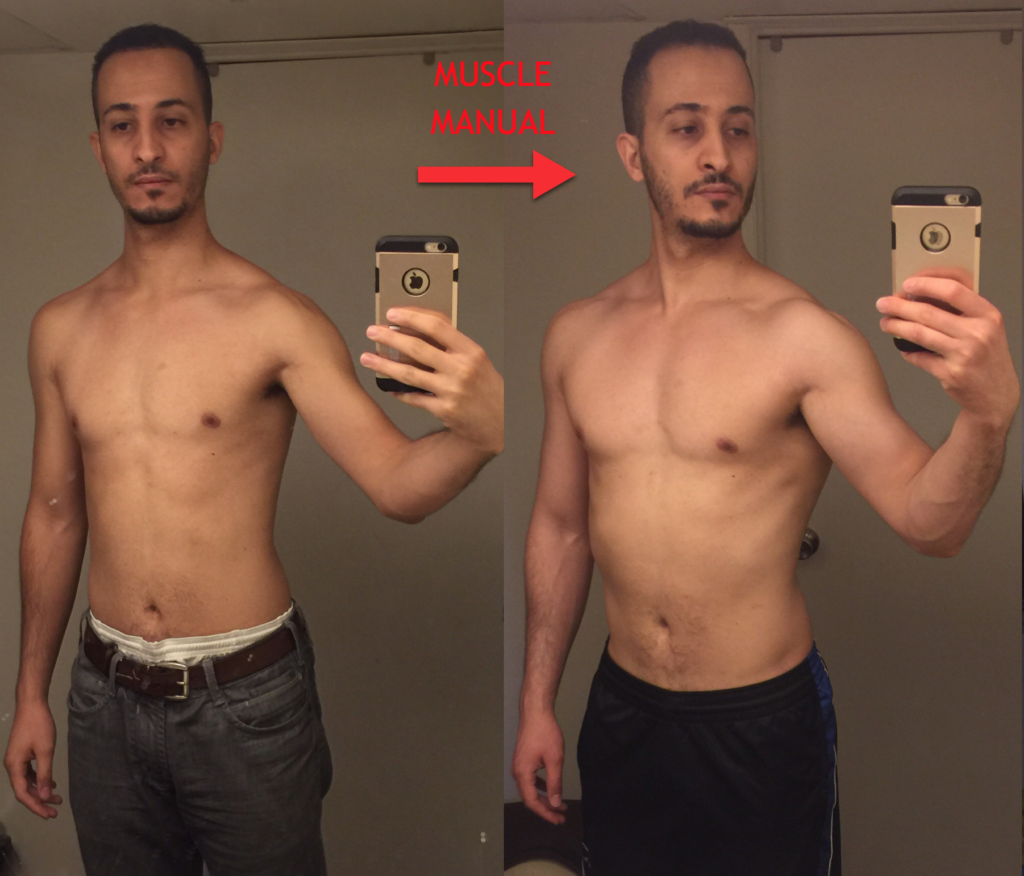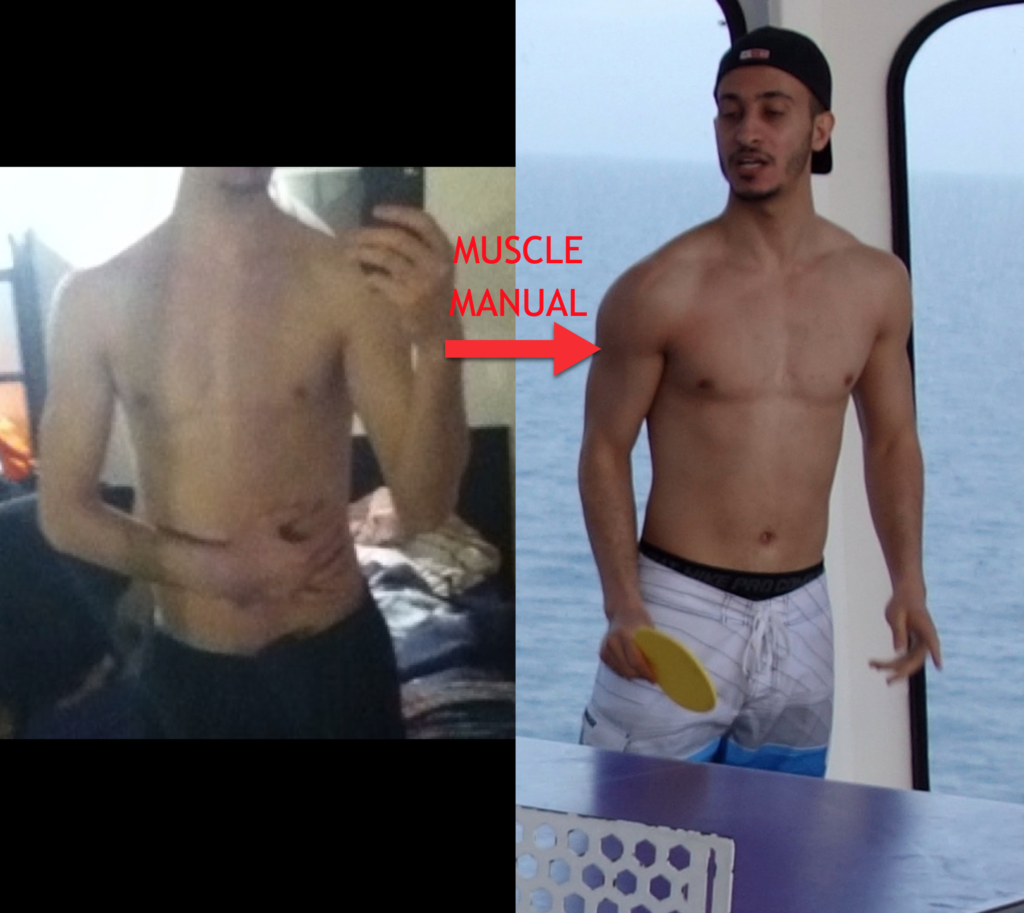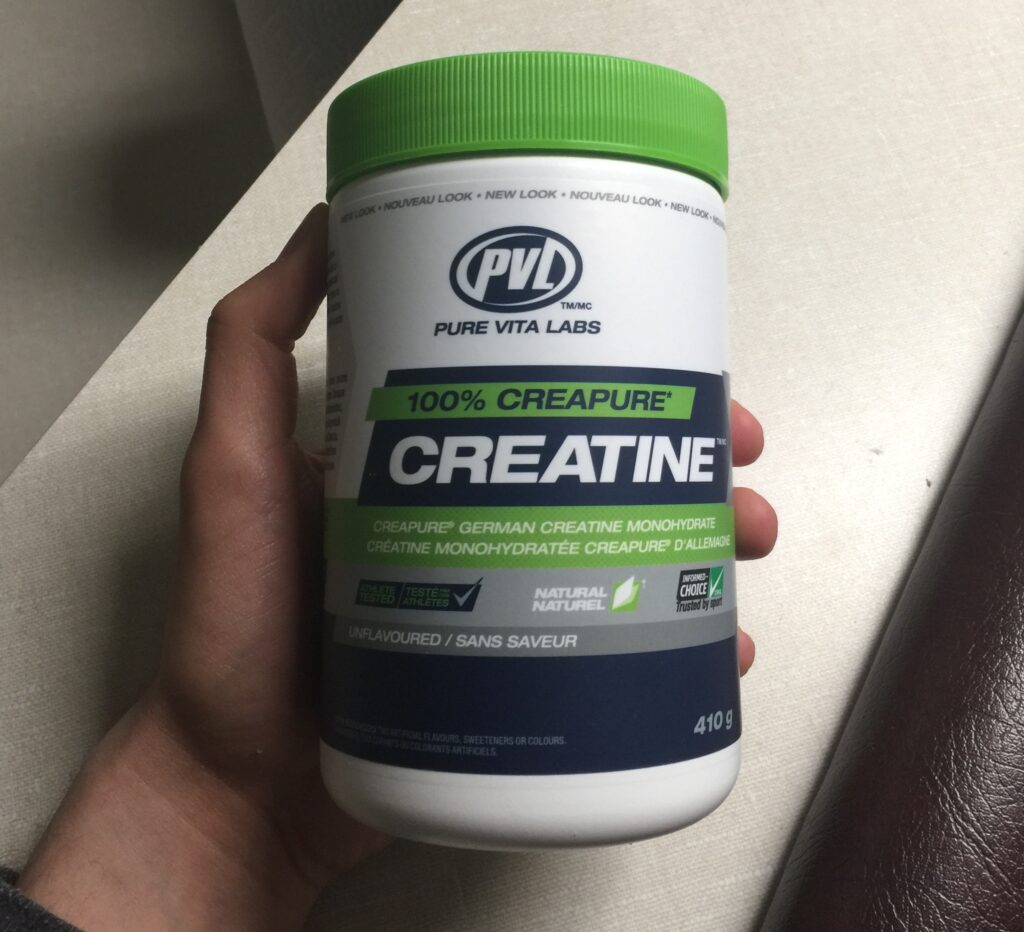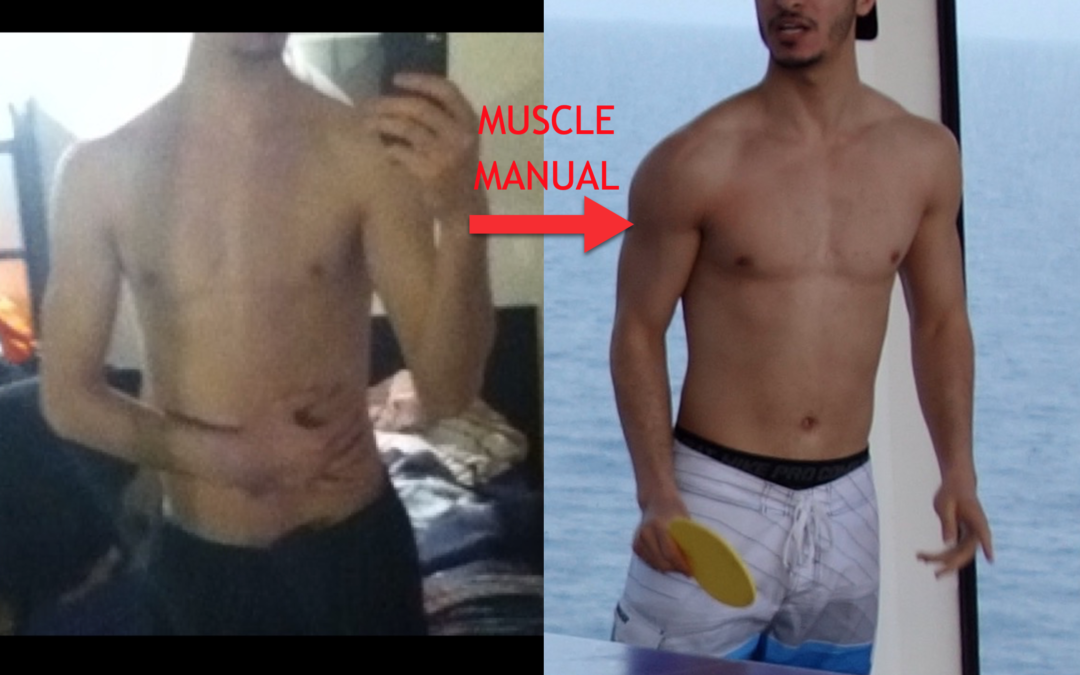When I was trying to build muscle and go from skinny to muscular, creatine helped me smash those lofty goals. It helped me put on 20 pounds of muscle mass after just 4 weeks of supplementing with creatine.
Now, of course, I was also taking whey protein and eating nutrient-dense high protein meals.
But creatine helped me get over that final hurdle of putting on muscle on my stubborn skinny frame.
That’s why I always say: If there’s only one supplement that I would take, besides whey protein, it would be creatine.
Whenever I take it and encourage my clients to take it, the results are truly remarkable.
From boosting muscle growth and enhancing cognitive function to accelerating post-workout recovery, creatine has become a go-to supplement for fitness enthusiasts and athletes alike.
But what really happens when you start taking creatine, and how does it affect your body and mind?
Let’s explore the creatine before and after effects for me personally, and how it can help you get the results you’re striving for.
Key Takeaways
Creatine supplementation leads to initial weight gain due to water retention, followed by increased strength and endurance by the second week, culminating in muscle saturation and enhanced performance after 30 days.
Long-term use of creatine promotes muscle growth by stimulating protein synthesis, accelerates recovery times, and contributes to increased fat-free mass, strength, and overall improved body composition.
In addition to physical benefits, creatine also has potential cognitive enhancements and neuroprotective properties, improving memory, cognitive function, and potentially benefiting those with neurodegenerative conditions.
Creatine: The Journey from Day 1 to Day 30

As you can see above, the effects on my muscle size are very apparent. Creatine supplementation helped me pack on the muscle mass that would have otherwise been very difficult to do. The effects were noticeable within just 2 weeks and started to really become significant after just 30 days of supplementing with creatine.
I’m going to explain exactly how this can work for you in the remainder of this article.
As you progress through the 30-day period of supplementation, the impacts of creatine supplementation will gradually become apparent. From initial weight gain and water retention to the saturation of muscle creatine levels, creatine can push you beyond those stubborn muscle-building plateaus.
We’ll commence with the onset phase.
Initial Effects: Weight Gain and Water Retention
You’ve just started your creatine regimen and within a week, you notice a slight uptick on the scale. This is your body’s natural response to creatine supplementation. The initial weight gain and water retention are due to your body retaining more fluid.
In fact, you can expect to gain between 1-5 pounds of body weight during just the initial week of creatine supplementation. This will be exciting for the hardgainers out there, as it’s a normal and temporary phase that sets the stage for the real gains to come.
This phase primes your muscles for the upcoming gains by increasing the water content of your muscle cells, making them larger and more prone to growth.
While this phase typically lasts about a week, the actual duration may vary depending on individual factors such as your diet, training regimen, and baseline creatine levels.
Midway Point: Strength and Endurance Boost
Moving into the second week of creatine supplementation, you’ll likely begin seeing notable enhancements in your strength and endurance.
Your muscles are now better equipped to handle high-intensity exercises, allowing you to lift heavier weights and perform more repetitions. This is a pivotal point, as the increased strength and endurance allow you to engage in more intense resistance training sessions, which, in turn, accelerates muscle growth.
Research backs up these observations, with several studies showing that incorporating creatine into a strength training regimen halfway through supplementation can enhance strength by 8%, weightlifting performance by 14%, and bench press one-rep max by as much as 43%.
Day 30: Muscle Saturation and Performance Enhancement
Upon reaching the 30th day of your creatine supplementation, your muscles will achieve full saturation with creatine.
This is where things really start to get exciting.
With your muscles now operating at peak performance, you’ll likely see noticeable improvements in your physical activities. This enhanced performance doesn’t just apply to your workouts. Whether you’re playing sports or simply doing physically demanding tasks, you’ll notice that you’re stronger, faster, and more resilient than before.
This isn’t just a temporary boost, either.
The increased strength, faster recovery, and potential muscle growth beyond water retention you experience at this point are the long-term benefits of consistent creatine supplementation.
Supplementing creatine for 28 days has been found to increase overall performance by 15% in well-trained and professional strength athletes. Additionally, it has also been shown to improve bench press performance by 6%.
Creatine’s Influence on Muscle Growth and Recovery

Having examined the timeline of creatine supplementation, let’s delve deeper into creatine’s impact on muscle growth and recovery.
From stimulating muscle protein synthesis to speeding up recovery times, creatine plays a key role in reshaping your body and enhancing your physical capabilities.
Creatine supplementation works in tandem with regular exercise to bolster muscle growth. It does this by stimulating muscle protein synthesis, a biological process where your body generates new proteins to repair and strengthen muscle tissue.
Meanwhile, creatine also speeds up recovery times by reducing muscle damage and facilitating the healing of micro-tears in muscle fibers. This means less downtime between workouts and more opportunities for muscle growth.
Stimulating Muscle Protein Synthesis
A primary mechanism through which creatine fosters muscle growth is by triggering muscle protein synthesis.
This process involves the creation of new proteins, specifically actin and myosin heavy chain, which are critical for muscle contraction. This increase in protein synthesis leads to muscle hypertrophy, or growth, and can significantly enhance your muscle mass and overall body composition.
The benefits of creatine on muscle protein synthesis extend beyond just muscle growth. It also plays a key role in improving body composition by contributing to an increase in fat-free mass and enhancing strength.
This makes creatine an effective supplement for athletes and individuals seeking to enhance muscle mass, performance, and recovery.
In fact, it’s also great supplement for guys trying to get rid of belly fat and build muscle at the same time.
Speeding Up Recovery Times
Although muscle development through is a significant facet of fitness, recovery holds equal importance.
Remember, you actually build muscle after the workouts, not during the workouts themselves.
And this is another area where creatine is really beneficial.
Creatine enhances workout recovery in several ways, including enhancing glycogen loading, reducing inflammation and muscle enzyme release, and increasing muscle glycogen resynthesis after intense exercise.
The benefit of faster recovery times is two-fold.
Not only does it mean less discomfort and muscle soreness post-workout, but it also allows for more frequent and intense training sessions. By reducing the recovery period after a workout, creatine allows you to get back into the gym sooner, thus maximizing your training volume and ultimately leading to greater muscle growth.
Long-term Muscle Gains
The immediate rewards of creatine supplementation, including enhanced strength and endurance, and expedited recovery, are pretty impressive.
But the real beauty of creatine lies in the long-term creatine benefits, such as significant muscle growth that comes with consistent use. Over time, the increased workout performance and consistent training result in substantial muscle gains.
These long-term muscle gains are not just about aesthetics.
They also translate into increased strength and improved physical performance. Whether you’re an athlete looking to enhance your performance or simply someone aiming to improve their physique and overall health, the long-term muscle gains from creatine supplementation can help you reach your goals.
Cognitive and Neurological Advantages of Creatine

Apart from its impact on physical fitness, creatine also potentially benefits brain function and neurological health.
From boosting memory and cognitive function to potentially having neuroprotective properties, creatine supplementation can be a valuable tool for supporting brain health.
Creatine works in the brain in a similar way to how it operates in muscles. It increases the brain’s creatine stores, resulting in potential improvements in brain function and memory, particularly for individuals with lower baseline creatine levels.
Let’s dive into the cognitive and neurological advantages offered by creatine.
Boosting Brain Function and Memory
Creatine has been shown to enhance brain function and memory by:
Helping to increase brain creatine levels
Leading to improved cognitive performance
Making tasks that require speed of thought or problem-solving skills easier
This cognitive boost isn’t just beneficial for older adults or individuals under metabolic strain—it can enhance mental performance for healthy young adults as well.
The cognitive enhancements from creatine supplementation extend beyond just processing speed and problem-solving.
Creatine supplementation has also been shown to enhance long-term memory performance, short-term memory/working memory, and measures of cognition. It can even help alleviate symptoms of depression and enhance stress resilience.
Potential Neuroprotective Properties
Beyond its cognitive benefits, creatine may also offer neuroprotective properties. This means that it could potentially provide benefits for those with neurodegenerative conditions such as Alzheimer’s and Parkinson’s disease.
In Alzheimer’s disease, creatine supplementation has shown potential benefits in enhancing brain bioenergetics, improving cognition and memory, and impacting AD biomarkers. In Parkinson’s disease, while the potential is more restricted, creatine has exhibited some capabilities in slowing the progression of the disease. It’s important to note, however, that while the potential benefits of creatine in these conditions are promising, more research is needed to fully understand its impact.
Creatine Dosage and Timing: Maximizing Results

Having discussed the many benefits of creatine supplementation, it’s pertinent that we discuss optimizing these effects through appropriate dosage and timing.
Whether you’re just starting your creatine journey or looking to optimize your current regimen, understanding the best practices for dosing and timing can help you get the most out of your supplementation.
The typical daily dosage of creatine for most individuals is 5g. However, depending on your specific goals and current fitness level, the optimal dosage and timing may vary.
Here’s a closer examination of strategies for creatine dosage and timing to optimize results.
Loading Phase vs. Maintenance Phase
When starting with creatine supplementation, many individuals opt for a loading phase. This involves supplementing with creatine by consuming a higher dose of creatine each day for the first week to rapidly increase muscle stores of creatine. This sudden influx of creatine into your system can quickly prime your muscles for growth and performance enhancement.
However, not everyone needs to follow a loading phase.
In fact, I personally advise against it. Why? Simply because I’d rather let the body slowly acclimate to the new supplement so as not to shock the system, especially the gut.
Research suggests that muscles can become saturated with creatine even with lower, maintenance doses. This means you can simply stick to a daily creatine intake of around 3-5 grams without needing to load up on creatine initially. This approach can also minimize the risk of digestive discomfort associated with higher doses.
Pre-Workout or Post-Workout?
Another aspect of creatine supplementation to consider is timing.
Should you take creatine before or after your workout?
The truth is, the optimal time to take creatine may depend on your individual circumstances and goals. With pre workout supplementation becoming increasingly popular, it’s essential to understand how it can affect your creatine intake.
Taking creatine before a workout can provide several benefits, such as producing more energy in muscle cells, supporting muscle functions, and enhancing high-intensity exercise performance.
On the other hand, consuming creatine post workout can also provide numerous benefits, including an increase in fat-free mass and strength, improved brain function, and accelerated muscle growth.
In the end, the most important factor is consistency, so choose a time that works best for your routine and stick to it.
Addressing Common Creatine Concerns

Considering all the benefits of creatine supplementation, it might appear obvious to include it in your fitness regimen.
However, like any supplement, creatine isn’t without its potential concerns.
From gastrointestinal discomfort to questions about long-term safety, it’s important to address these concerns to ensure you’re making informed decisions about your health and fitness.
While creatine is generally considered safe for most individuals, it’s always a good idea to consult with a healthcare professional before starting any new supplement regimen.
Here are some of the most common apprehensions surrounding creatine supplementation:
Gastrointestinal Discomfort and Mitigation Strategies
One of the most common side effects associated with creatine supplementation is gastrointestinal discomfort. This can include symptoms like:
Nausea
Stomach pain
Diarrhea
Muscle cramps
These symptoms can often be traced back to excessive doses or high intake of creatine during supplementation.
Fortunately, there are strategies to mitigate these side effects.
Dividing the dose can help alleviate stomach discomfort by avoiding the intake of excessive amounts of creatine at once.
Avoiding caffeine when taking creatine can also reduce the risk of gastrointestinal distress, as caffeine can have opposite effects on relaxation time and contribute to gastrointestinal discomfort.
Safety and Long-term Use
Another common concern about creatine supplementation revolves around its safety for long-term use.
Studies have demonstrated that daily consumption of creatine supplements, even over several years, is considered safe. There is no evidence indicating significant long-term risks associated with creatine use.
However, like any supplement, creatine should be used responsibly.
While there is no conclusive evidence of kidney or liver damage from recommended doses of creatine monohydrate supplementation, some studies suggest a possible risk. It’s always a good idea to consult with a healthcare professional before starting any new supplement regimen, especially for long-term use.
Summary
In conclusion, creatine supplementation offers a host of benefits for both physical and cognitive performance. From enhancing muscle growth and speeding up recovery times to improving brain function and potentially offering neuroprotective properties, the benefits of creatine are vast and varied.
With a clear understanding of the dosage and timing strategies and addressing common concerns, you can harness the full potential of creatine to reach your fitness and health goals.
Just remember, while creatine is a powerful tool, it works best when combined with a balanced diet, consistent training, and adequate rest.
It is the ultimate supplement, besides whey protein, when it comes to bulking – especially for skinny guys!
Frequently Asked Questions
Do muscles look bigger on creatine?
Yes, muscles may look bigger on creatine due to increased water retention, which makes the muscles appear fuller. It’s important to stay hydrated to maximize the benefits of creatine.
What happens after 1 month of creatine?
After one month of consistent creatine supplementation, your muscles will be fully saturated with it, leading to increased strength, improved recovery after workouts, and reduced muscle soreness.
How long will it take to see results from creatine?
You can expect to see increased strength and endurance within 2-4 weeks by taking a modest dose of 3-5 grams of creatine daily. Creatine loading with 20-25 grams daily for 7 days can produce results in just 5-7 days.
Is creatine better before or after workout?
Research suggests that post-workout creatine supplementation provides better results in building mass and strength compared to pre-workout supplementation. However, pre-workout creatine also offers benefits.
What are the immediate effects of creatine supplementation?
The immediate effects of creatine supplementation are weight gain and water retention, noticeable within the first week, ultimately resulting in increased body weight.


Recent Comments